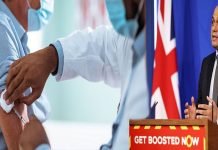
NHS doctors have been warned to look out for a rare but dangerous reaction in children that may be linked to coronavirus infection.
A coronavirus-related syndrome among children may be emerging in the UK, a health alert sent to GPs suggests.
An urgent alert sent out to GPs said that intensive care departments in London and other parts of the UK have been treating severely sick children with unusual symptoms.
This includes “multi-system inflammation” with flu-like symptoms.
Some, but not all, tested positive for coronavirus.
It is unclear how many children have been diagnosed with the new syndrome, although the numbers will be low.
The UK Paediatric Intensive Care Society (PICS) tweeted an alert it said was from NHS England that warned of a “rise in the number of children presenting with a multi-system inflammatory state”.
The apparent warning said the condition required “intensive care” treatment.
*Urgent alert*
— PICSUK (@PICSociety) April 26, 2020
Rising no of cases presenting to #PedsICU with multi-system hyperinflammatory state, overlapping features of toxic shock syndrome & atypical Kawasaki disease, bloods consistent with severe #COVID19 – seen in both #SARSCoV2 PCR +ve AND -ve
Please share widely pic.twitter.com/Bj6YHLJ8zi
The tweet from PICS said: “Over the last three weeks, there has been an apparent rise in the number of children of all ages presenting with a multi-system inflammatory state requiring intensive care across London and also in other regions of the UK”.
According to the alert, which has also been shared with GPs, children affected display signs similar to toxic shock syndrome (TSS), a severe illness associated with infections, and have blood markers in line with severe Covid-19 in children.
They may also have abdominal pain and symptoms of inflammation around the heart
The alert continues: “There is a growing concern that a SARS CoV-2 (Covid-19) related inflammatory syndrome is emerging in children in the UK, or that there may be another, as yet unidentified, infectious pathogen associated with these cases.”
The message sent to doctors talks about atypical Kawasaki disease – a condition that mainly affects children under the age of five.
Symptoms include a high temperature that lasts for five days or more, often with a rash and/or swollen glands in the neck.
The alert, which has now been shared more widely, advises these cases need urgent treatment.
But experts stress that very few children become severely ill with coronavirus – evidence from around the world suggests they are the population least affected by the disease.
Dr Nazima Pathan, a consultant in Paediatric Intensive Care in Cambridge, said colleagues in Spain and Italy had been reporting similar cases: “Some of the children have presented with a septic shock type illness and rashes – the kind of presentation we would expect to see in toxic shock syndrome and Kawasaki disease (which affects blood vessels and the heart).
“Overall, children seem to be more resilient to serious lung infection following exposure to coronavirus, and the numbers admitted to intensive care units are relatively low.”
NHS England said it knew of fewer than 20 such cases in the country where an association has been noted by clinicians. Investigations will continue, but no link has yet been established, said a spokesman.
The Royal College of Paediatrics and Child Health (RCPCH) said parents should be reassured by this, but if they are concerned about their children’s health for any reason, they should seek help from a health professional.
Washing kids’ hands frequently, wiping down contact surfaces and keeping ill children out of school are essential precautions, experts say.
Prof Simon Kenny, NHS national clinical director for children and young people, said: “The advice to parents remains the same: if you are worried about your child for whatever reason, contact NHS 111 or your family doctor for urgent advice, or 999 in an emergency, and if a professional tells you to go to hospital, please go to hospital.”
When to seek help
Whilst coronavirus is infectious to children, it is rarely serious. If your child is unwell it is likely to be a non-coronavirus illness, rather than coronavirus itself.
The RCPCH advises parents seek urgent help (call 999 or go to A&E) if their child is:
- Becoming pale, mottled and feeling abnormally cold to the touch
- Has pauses in their breathing (apnoeas), has an irregular breathing pattern or starts grunting
- Has severe difficulty in breathing becoming agitated or unresponsive
- Is going blue round the lips
- Has a fit/seizure
- Becomes extremely distressed (crying inconsolably despite distraction), confused, very lethargic (difficult to wake) or unresponsive
- Develops a rash that does not disappear with pressure (the ‘Glass test’)
- Has testicular pain, especially in teenage boys
Professor Russell Viner, president of the Royal College of Paediatrics and Child Health (RCPCH), said parents should be reassured that children are unlikely to be seriously ill with Covid-19.
#covid19uk #Coronavirus #SocialDistancing #NHSPPE #StayHomeSaveLives
Support Independent Journalism Today
Our unwavering dedication is to provide you with unbiased news, diverse perspectives, and insightful opinions. We're on a mission to ensure that those in positions of power are held accountable for their actions, but we can't do it alone. Labour Heartlands is primarily funded by me, Paul Knaggs, and by the generous contributions of readers like you. Your donations keep us going and help us uphold the principles of independent journalism. Join us in our quest for truth, transparency, and accountability – donate today and be a part of our mission!
Like everyone else, we're facing challenges, and we need your help to stay online and continue providing crucial journalism. Every contribution, no matter how small, goes a long way in helping us thrive. By becoming one of our donors, you become a vital part of our mission to uncover the truth and uphold the values of democracy.
While we maintain our independence from political affiliations, we stand united against corruption, injustice, and the erosion of free speech, truth, and democracy. We believe in the power of accurate information in a democracy, and we consider facts non-negotiable.
Your support, no matter the amount, can make a significant impact. Together, we can make a difference and continue our journey toward a more informed and just society.
Thank you for supporting Labour Heartlands











